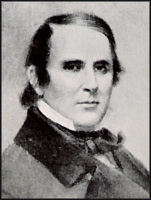- William Butler Ogden
Infobox_Politician
name = William Butler Ogden

width = 150px
height = 200px
birth_date = birth date|1805|6|15
birth_place =Walton, New York
death_date = death date and age|1877|8|3|1805|6|15
death_place =New York ,New York (http://www.pbs.org/wgbh/amex/chicago/peopleevents/p_ogden.html)
residence =Chicago ,Illinois
office = Mayor of Chicago
order= 1st
term_start = 1837
term_end = 1838
office2 = Member of theNew York State Assembly
term_start2 = 1834
term_end2 = 1835
predecessor = None
successor =Buckner Stith Morris
party = Democratic
religion =
spouse =
children =
website =
occupation = Real Estate DeveloperWilliam Butler Ogden (
June 15 1805 -August 3 1877 ) was the first Mayor ofChicago .Ogden was born in
Walton, New York . When still a teenager, his father died and Ogden took over the familyreal estate business. He assisted Charles Butler, his brother-in-law, with business matters related to opening a new building forNew York University , attending thelaw school for a brief period himself. In 1834, he was elected to theNew York state legislature . The following year, he traveled to Chicago to look over land bought by Charles Butler for $100,000. Ogden informed Butler that he had been taken. Despite that, Ogden recovered the $100,000 by selling off one-third of the property that Butler had purchased. This experience helped change his impression of the city.During his term as Chicago's first mayor, 1837-1838, the land rush that had brought him to the
Midwest collapsed, but Ogden managed to help the city weather the storm.Ogden designed the first
swing bridge over theChicago River and donated the land for Rush Medical Center.Ogden was a leading promoter and investor in the Illinois and Michigan Canal, then switched his loyalty to railroads. Throughout his later life, Ogden was heavily involved in the building several railroads. "In 1847, Ogden announced a plan to build a railway out of Chicago, but no capital was forthcoming. Eastern investors were wary of Chicago's reputation for irrational boosterism, and Chicagoans did not want to divert traffic from their profitable canal works. So Ogden and his partner J. Young Scammon solicited subscriptions from the farmers and small businessmen whose land lay adjacent to the proposed rail. Farmer's wives used the money they earned from selling eggs to buy shares of stock on a monthly payment plan. By 1848, Ogden and Scammon had raised $350,000 -- enough to begin laying track. The Galena and Chicago Union Railroad was profitable from the start and eventually extended out to Wisconsin, bringing grain from the Great Plains into the city. As president of Union Pacific, Ogden extended the reach of Chicago's rail lines to the West coast." (http://www.pbs.org/wgbh/amex/chicago/peopleevents/p_ogden.html)
Later he served on the board of the
Mississippi and Missouri Railroad and lobbied with many others for congressional approval and funding of the transcontinental railroad. After the 1862Pacific Railroad Act , Ogden was named as the first president of theUnion Pacific Railroad . Ogden was a good choice for the first president, but his railroad experience was most likely not the primary reason he was chosen; Ogden was a clever man who had many political connections. When Ogden came to lead the Union Pacific, the railroad wasn't fully funded and hadn't yet laid a single mile of track — the railroad existed largely on paper created by an act of Congress. As part of the 1862Pacific Railroad Act , Congress named several existing railroad companies to complete portions of the project. Several key areas needed to link the East (Chicago) to the West had none, and hence the Union Pacific was formed by Congress. Ogden was a fierce supporter of the transcontinental railroad at a time of great unrest for the country and was quoted as saying: "This project must be carried through by even-handed wise consideration and a patriotic course of policy which shall inspire capitalist of the country with confidence. Speculation is as fatal to it as
secession is to the Union. Whoever speculates will damn this project.As history now shows, eventually Ogden and many others got their wish. Several railroads later, Ogden Flats, Utah, where the
Golden Spike was driven, was named for him.On
October 8 ,1871 , Ogden lost most of his prized possessions in theGreat Chicago Fire . He also owned a lumber company inPeshtigo, Wisconsin , which burned the same day.In 1860, Ogden switched his loyalty to the Republican Party, which shared his views regarding
slavery , although he left the party over a dispute withAbraham Lincoln . Ogden felt that theEmancipation Proclamation was premature. Following his defection from the Republican party, Ogden retired from politics and moved back to his native New York.A stretch of
U.S. Highway 34 , called Ogden Avenue in Chicago and itssuburb s, is named after him.Ogden Elementary School , on Walton Place in Chicago, is also named after him.
Wikimedia Foundation. 2010.
